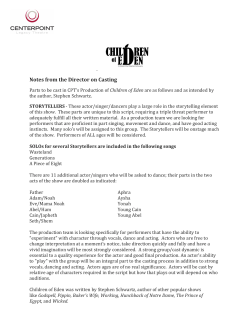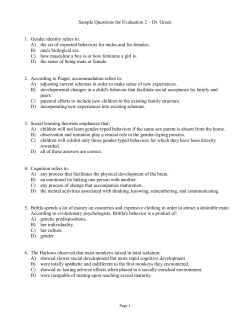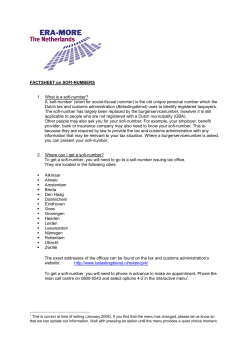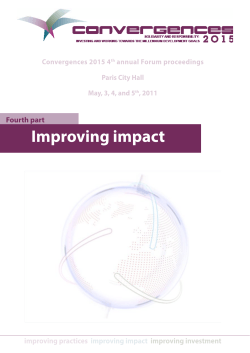
Deltas in Depth scientific sessions
Deltas in Depth scientific sessions Deltas in Depth Theme 9. Governance of adaptation DD 9.4 Innovation and experimentation in governing adaptation Chair Presentations MSc Heleen Mees, Utrecht University, the Netherlands Belinda McFadgen, Institute for Environment Studies, the Netherlands) MSc Marjolein van Eerd, Radboud University Nijmegen / Knowledge for Climate, the Netherlands Anja Wejs, Aalborg University, Denmark Introduction Heleen Mees opens the session by explaining the aim of the session, finding out innovations and elaborating the role of experimentation in governing climate adaptation. The session consists of three presentations and a discussion. Learning by experiment. How the institutional design of a policy experiment can influence policy learning. Belinda McFadgen, Institute for Environment Studies, the Netherlands Belinda works in the Knowledge for Climate programme on the theme adaptive governance. She studies flexibility in policy processes. In her research she studies the role of different experimentations and to what kind of learning this leads. Belinda defines three types of learning: cognitive, normative and relational policy learning. Next to this, for Belinda there are three types of experiments: technocratic, advocacy and boundary experiments. Based on her research several correlations can be found between the types of experiments and the types of learning. The methodology of regression analysis is a good way of measuring to what extent actors have learnt. The cases used are not very controversial or urgent. For this reason the relation between experiments and learning should be studied in a broader context. Q1: Is there a relation between social aspects of actors and policy learning? This may be of influence on the relation between learning and experimentation. A1: That is right. The context of actors is really important. Context is always larger than these two variables Q2: Social learning may show up in the next experiment. Individuals can learn later on. A2: This may be true. Q3: There are many examples of experiments. In the Netherlands the example of learning alliances is has been practiced. Often, the option of failure in real situations is not available for practitioners. Is failure a disadvantage in an experiment? A3: The used definition in this presentation is rare. Failure can in practice lead to learning. Possibilities and restrictions for transboundary climate adaptation governance for the Netherlands. Marjolein van Eerd, Radboud University Nijmegen/Knowledge for climate, the Netherlands Marjolein studied the possibilities and restrictions for transboundary climate adaptation governance for the Netherlands. In her presentations she stresses the need for cooperation. There are many opportunities for working across borders. The role of the EU is important. Based on her research Marjolein can present some lessons learnt. Sometimes practitioners do not know what other actors are doing on the other side of the border. Mutual understanding is really important. A condition for 1 this is that both parties see the benefit of cooperation. This can be realized by linking climate change adaptation to ongoing streams of policies. Marjolein stresses the importance of a timely start with cross-border cooperation. Involve actors from the start. Q1: In your presentation you stress the need for timely start cross-border cooperation? Isn’t it a risk to let everybody join from the beginning? The risk of conflicts is always present. A1: Start as early with cooperation as you can. Involving actors too late can lead to larger conflicts. Q2: There are different cultures between countries. The local context is sometimes complicating. A2: It is important to make the context simple and easy to communicate. Water (without) borders. The horizontal collaboration on climate change adaptation in North Denmark. Anja Weijs, Aalborg University Denmark Anja starts her presentation by explaining the institutional changes in recent history. Denmark had many of these in recent years which influence the implementation of climate change policies. In Denmark, a lot of climate adaptation plans are in the mapping phase. Implementation is not really at stake at this moment. In Denmark the utility companies sometimes refrain from cooperation around the implementation of climate adaptation measures. That is why the plans are sometimes hard to implement. Utility companies associate climate adaptation measures too much with extra costs. The question is how to bring all the relevant stakeholders into collaboration. Anja concludes that there is a lot of fragmentation, rural areas have difficulties to accommodate. More regulation can help to accelerate the implementation of climate adaptation. Q1: There are many buttons to press at the same time. From financial incentives to communication to regulation. Still it seems to be not enough? A1: In Denmark we see that it is still hard to reach the implementation phase. Regulations can help as an incentive. Q2: What is the role of the public/citizens in relation to climate change adaptations? A2: In Denmark people are used to the fact that institutions do the job. Discussion Heleen Mees opens the discussion. She states that the need for cooperation was stressed by all speakers. She asks the question why this does still not always occur? Do some actors have an interest in not cooperating?. One of the attendees brings in that more knowledge is more power. For this reason, cooperation is not always obvious. Another argument is that institutions are fighting for their position. They want to show their capacity to deal with the problems. They also would like to have work for the future. Another attendee stresses the importance of an independent project manager. This project manager does not have a stake to defend and can function as greaser between actors. He can bring in actors when needed. Some others are doubting this solution. They state that the weakness of governance is too much deliberation, too little action. Every actor still has the right to make his/her own decision. Legislation is about forcing others. In a good cooperation, both parties see added value in working together. Making people conscious of climate change is seen as the key. 2
© Copyright 2025





















